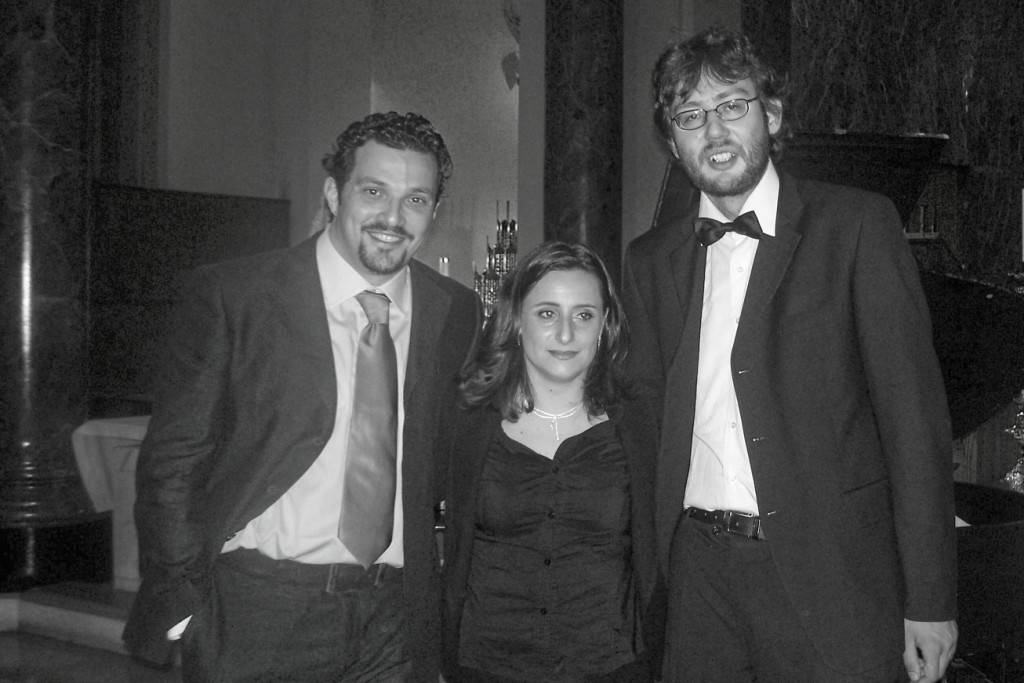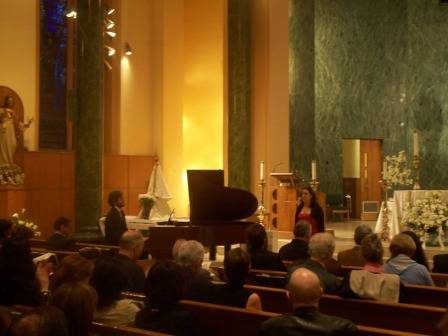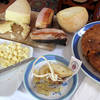Umbria, Not Only Jazz. Spoleto’s Opera in the Backstreets of Soho
When you get to Saint Anthony of Padua Church down in Soho you feel you are back in Italy. Sullivan Street is crowded with Italian shops and delicatessens, people sit in the middle of the street chatting and spending long hours there, maybe playing cards, watching the sun rise and set. It is a scene you imagine you would see only in those small villages of which the peninsula is crowded, where people seem to have nothing else to do than spending their time on the doorsteps of the only Church in town. But it was Manhattan, just a few steps away from the buzz of the Village.
Entering the oldest Catholic Church in the United States gives you quite a strange sensation - something that tells you that you are about to live a solemn moment that deserves respect and attention. The thrilled excitement of the people present confirms this sensation. Most of them speak Italian, and many of them are extremely young, which is very unusual given the kind of event they were about witness.
Opera does not attract the young generation - at least in most cases. But in this case, the lyrical show produced and promoted by the Teatro Lirico di Spoleto A. Belli constitutes a fair exception. The Vocal Concert given on the evening of May 7 was just a taste of what you can see in Spoleto during the Spoleto Opera Season during which the numerous students of the foundation perform arias that have given world-fame to Italian music.
Adriano Belli, a lawyer and musicologist, founded the Teatro Lirico in 1947. He had one only aim in his mind: to help young singers start a career in Opera, above all students who had already completed their singing studies but had not yet made their artistic debut. The activities of the Teatro are divided into three phases: the first is the European Community Competition for Young Opera Singers which concludes with a complete screening of the applicants.
Those who are accepted go on to the second phase, the Training Course For the Debut. In this period they improve and practice their singing and learn at least an opera from the sixteen/seventeenth century, one from the eighteenth century and one from the nineteenth century. Once this second period is finally concluded, the artists are called on to perform in the Opera Season of the Teatro which aims to show the results of the training courses and is usually held in Spoleto in September.
Desirée Migliaccio, Giulio Boschetti and Francesco Massini were the three talented young singers and musicians that performed for us on that evening. When the public first met them, they were still not dressed up and were chatting with everybody just as every other person of their age in a friendly atmosphere would have done. They acted so spontaneously that some people from the audience did not guess they were about to perform until they left to get ready!
For a very long moment everything stopped and all we heard was Desirée singing from the other side of the altar. And we knew that our expectations had not been high enough. This was going to be memorable.
Francesco Massimi was the first one to come out from backstage. A Pianist, he is still only 26 but has already won many competitions and been in Qatar and Japan with the Teatro’s opera tours. In 2002 he attended the Course for Piano Accompainist of Opera at the Teatro and has worked for the institution as Opera Conductor during the 2007 Experimental Opera Season.
He sat at his grand piano while Giulio Boschetti came out to sing “Cruda, Funesta Mania” from “Lucia di Lammermoor” by Donizetti, the first of the seven pieces chosen for the concert. A baritone, Giulio has been collaborating with the Teatro for a very long time. He played the role of Bartolo in Mozart’s “Le Nozze di Figaro” and Fiorello in Rossini’s “Il Barbiere di Siviglia” in two different Japanese tours and in 2009 he performed for the Teatro at the Hermitage International Festival in St. Petersburg, Russia.
While singing, the public could also notice his remarkable acting skills, and “feel” the Opera through his interpretation. He also sang “Largo al factotum” from Rossini’s “Il Barbiere di Siviglia”, maybe his war horse, and “Pari Siamo” from Verdi’s Rigoletto.
He alternated on the stage with Desireé, this beautiful young Soprano from Ischia. In a red velvet dress, she welcomed her public singing the “Regnava nel silenzio” aria from Donizetti’s “Lucia di Lammermoor”. Her voice vibrated against the columns of the church when she finally played “Caro Nome”, from Verdi’s “Rigoletto”, revealing the incredible strength of her tiny body, a real rarity for a Soprano. Her name is already well know by a wide public, since Ennio Morricone lately chose her for his “Cinema Concerto” tour. She started collaborating with the Teatro only in 2008, when she won the “European Community Competition”. Her outstanding talent allowed her to soon after obtain many important roles, one among which being Gilda in Verdi’s Rigoletto.
The alternation of the two singers on the stage took the public on a long voyage in the history of Italian Opera. Could that concert end so soon? No, of course. The singers and pianist Massimi were having fun themselves. The show must go on, right?
“Now we have a present for you”, claimed Desirée when everybody was just about getting ready to leave. “How about some Neapolitan music?”.
And there they went. Boschetti’s “Je te vurria vasà” preceded her “Torna ‘a Surriento”, while the hundreds sitting on the benches echoed them.
Their final duo “’O sole mio” (which they sang with felt passion) ended the concert leaving everybody deeply satisfied. Living so far from their homeland, many Italians in New York feel the need of a little taste of Italy once in a while. On that evening the Umbria Region, the City of Spoleto and the Teatro Lirico Sperimentale A.Belli gave it to them, making all those present feel a part of one community. When we finally came out of the church, some of us walked away alone while others remained and formed a group ready to spend the evening together accompanied by the notes of Italian Opera.











































i-Italy
Facebook
Google+
This work may not be reproduced, in whole or in part, without prior written permission.
Questo lavoro non può essere riprodotto, in tutto o in parte, senza permesso scritto.